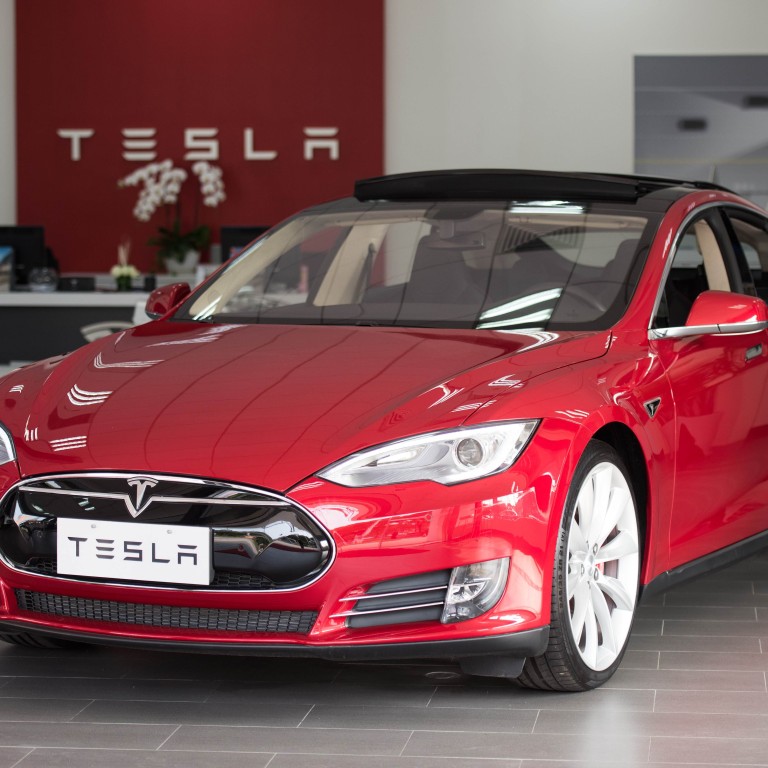
Tesla's sluggish China sales may get boost as Beijing expected to bend lottery rules for car maker's plates amid electric vehicle push
Beijing is about to make it easier for buyers of a Tesla Model S to get a license plate in the increasingly congested capital, according to sources close to the municipal transport authorities, Chinese news site stcn.com reported on Tuesday.
The city, which has over 5 million cars on the road, has been dishing out plates via a lottery system since 2011. But the odds of motorists there getting one for a petrol - or diesel - powered car are less than 1 per cent, compared to 38 per cent for a new energy vehicle.
Previously, foreign auto makers were all bundled into the same lottery system, regardless of what kind of fuel they depended on.
But Beijing is expected to announce a policy change this month during which it will make an exception for the California-headquartered company founded by serial entrepreneur Elon Musk 12 years ago.
Sources told Chinese media that Tesla cars will be put on a special list of new energy cars for the first time among foreign auto makers.
WATCH: Tesla Model S P85D vs Lamborghini Aventador Race
So far, this special status has only been enjoyed in Beijing by seven models from China’s big four auto manufacturers: BAIC Motor Corporation, SAIC Motor, JAC Motors and BYD.
These same models also enjoy generous subsidies from the central and local government, but Tesla will remain ineligible, the report said.
The grants can add up to nearly 110,000 yuan (US$17,300) in the capital, which is keen to promote the use of new energy vehicles both to lessen pollution and as part of a broader push to build up China’s car industry.
If confirmed, the latest policy change should help raise Tesla’s sluggish sales in at least one part of the country.
READ MORE: Watch out, Tesla: China's NextEV plots even faster 'electric supercar' amid backing from Tencent, JD.com, Hillhouse Capital
The company has ridden a bumpy road in China, selling just 2,000 cars in the first six months of 2015. It said earlier this year it would axe a large share of its Chinese work force amid reports of lower-than-expected sales and excess inventory in China.
It targeted sales of 10,000 cars in China last year but saw demand peak at 4,000, with some 2,400 eventually getting plates nationwide, Chinese media reports said.
Only the Model S, a luxury sedan, is available for purchase in Beijing, not its predecessor, the Tesla Roadster, the world's first fully electric sports car.
The US car maker said it plans to launch its Model X sports utility vehicle in some markets this month.
According to Beijing’s transport commission, 120,000 plates will be issued via a lottery this year, including 30,000 for new energy cars and the rest for those running on petrol or diesel.
Motorists were almost guaranteed a registration plate for a new energy vehicle in the first few months of 2015, but as the year progressed and demand grew, their chances of “winning” the lottery have diminished considerably.
The success rate fell from 100 per cent in April to 88 per cent in June and 38 this month as the number of applicants quickly swelled, according to Chinese media.
State media said the odds of getting a plate for a gas-powered vehicle stand at a meagre 0.52 per cent this month.
Seven Chinese cities restrict vehicle registrations: Beijing and Tianjin in the north, Shanghai in the east, Shenzhen and Guangzhou in southern Guangdong province, and Guiyang, the capital of western Guizhou province.
Beijing and Guiyang issue plates through lotteries while Shanghai uses a bidding scheme. The others have adopted hybrid systems.
The average price for a plate in August was 54,237 yuan in Shenzhen and 82,642 yuan in Shanghai.
China’s transport ministry said in March it hoped to add 200,000 buses and 100,000 taxis powered by alternative fuel nationwide by 2020.
Many Chinese cities are plagued by heavy pollution, with rising car use and carbon-emitting factories contributing heavily.

